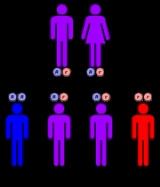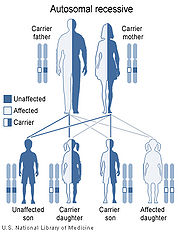
Triosephosphate isomerase deficiency
Encyclopedia
Triosephosphate isomerase deficiency is a rare autosomal
recessive metabolic disorder which was initially described in 1965.
It is a unique glycolytic
enzymopathy that is characterized by chronic haemolytic anaemia, cardiomyopathy
, susceptibility to infections, severe neurological dysfunction, and, in most cases, death in early childhood. The disease is exceptionally rare with fewer than 100 patients diagnosed worldwide.
 Thirteen different mutations in the respective gene, which is located at chromosome 12p13 and encodes the ubiquitous housekeeping enzyme triosephosphate isomerase (TPI), have been discovered so far. TPI is a crucial enzyme of glycolysis
Thirteen different mutations in the respective gene, which is located at chromosome 12p13 and encodes the ubiquitous housekeeping enzyme triosephosphate isomerase (TPI), have been discovered so far. TPI is a crucial enzyme of glycolysis
and catalyzes the interconversion of dihydroxyacetone phosphate and glyceraldehyde-3-phosphate. A marked decrease in TPI activity and an accumulation of dihydroxyacetone phosphate have been detected in erythrocyte extracts of homozygous (two identical mutant alleles) and compound heterozygous (two different mutant alleles) TPI deficiency patients. Heterozygous individuals are clinically unaffected, even if their residual TPI activity is reduced. Recent work suggests that not a direct inactivation, but an alteration in TPI dimerization might underlie the pathology. This might explain why the disease is rare, but inactive TPI alleles have been detected at higher frequency implicating a heterozygote advantage
of inactive TPI alleles.
The most common mutation causing TPI deficiency is TPI Glu104Asp. Interestingly, all carriers of the mutation are descendants of a common ancestor, a person that lived in what is today France or England more than 1000 years ago.
Autosome
An autosome is a chromosome that is not a sex chromosome, or allosome; that is to say, there is an equal number of copies of the chromosome in males and females. For example, in humans, there are 22 pairs of autosomes. In addition to autosomes, there are sex chromosomes, to be specific: X and Y...
recessive metabolic disorder which was initially described in 1965.
It is a unique glycolytic
Glycolysis
Glycolysis is the metabolic pathway that converts glucose C6H12O6, into pyruvate, CH3COCOO− + H+...
enzymopathy that is characterized by chronic haemolytic anaemia, cardiomyopathy
Cardiomyopathy
Cardiomyopathy, which literally means "heart muscle disease," is the deterioration of the function of the myocardium for any reason. People with cardiomyopathy are often at risk of arrhythmia or sudden cardiac death or both. Cardiomyopathy can often go undetected, making it especially dangerous to...
, susceptibility to infections, severe neurological dysfunction, and, in most cases, death in early childhood. The disease is exceptionally rare with fewer than 100 patients diagnosed worldwide.
Cause, Pathophysiology and Genetics

Glycolysis
Glycolysis is the metabolic pathway that converts glucose C6H12O6, into pyruvate, CH3COCOO− + H+...
and catalyzes the interconversion of dihydroxyacetone phosphate and glyceraldehyde-3-phosphate. A marked decrease in TPI activity and an accumulation of dihydroxyacetone phosphate have been detected in erythrocyte extracts of homozygous (two identical mutant alleles) and compound heterozygous (two different mutant alleles) TPI deficiency patients. Heterozygous individuals are clinically unaffected, even if their residual TPI activity is reduced. Recent work suggests that not a direct inactivation, but an alteration in TPI dimerization might underlie the pathology. This might explain why the disease is rare, but inactive TPI alleles have been detected at higher frequency implicating a heterozygote advantage
Heterozygote advantage
A heterozygote advantage describes the case in which the heterozygote genotype has a higher relative fitness than either the homozygote dominant or homozygote recessive genotype. The specific case of heterozygote advantage is due to a single locus known as overdominance...
of inactive TPI alleles.
The most common mutation causing TPI deficiency is TPI Glu104Asp. Interestingly, all carriers of the mutation are descendants of a common ancestor, a person that lived in what is today France or England more than 1000 years ago.

